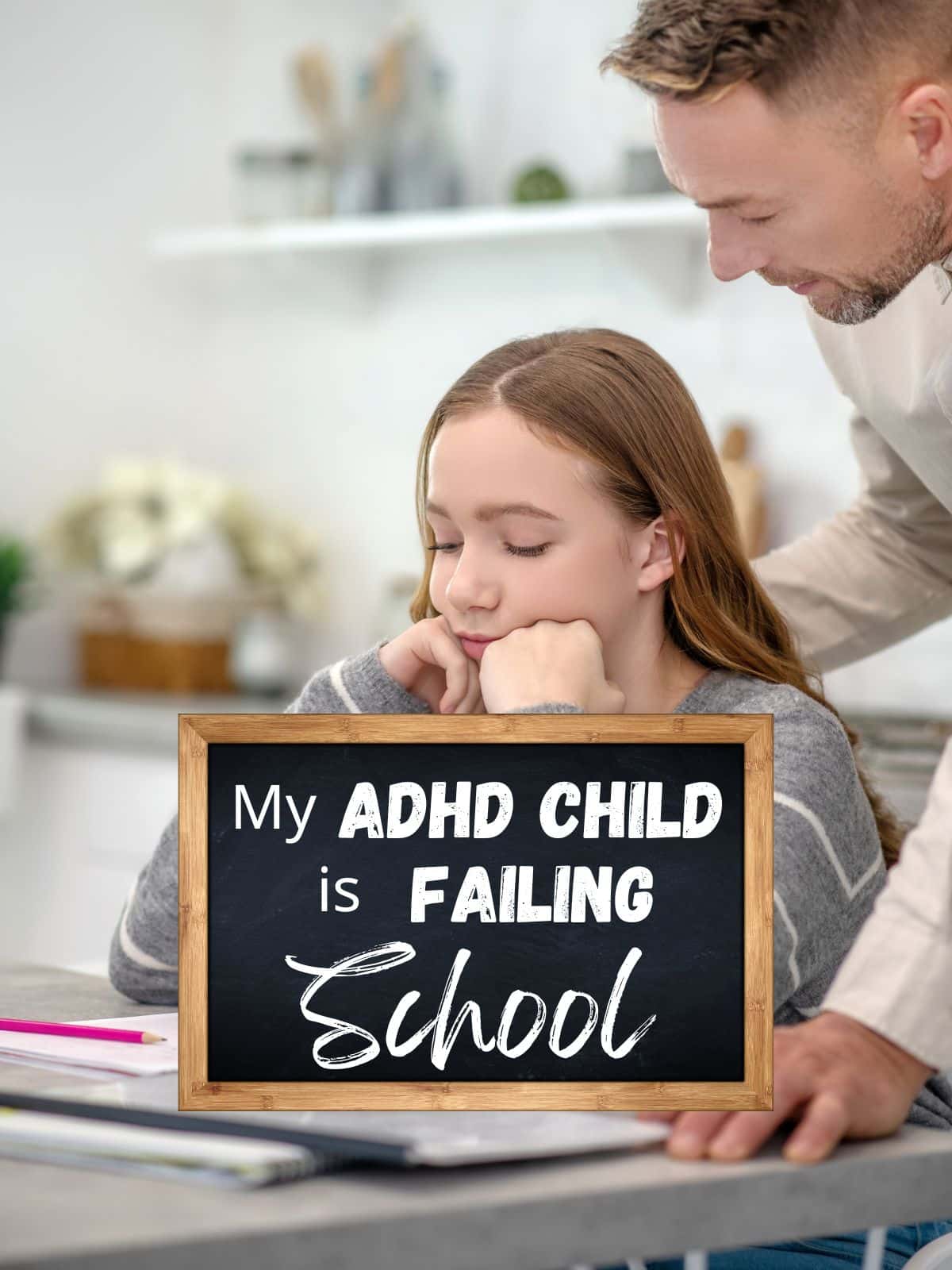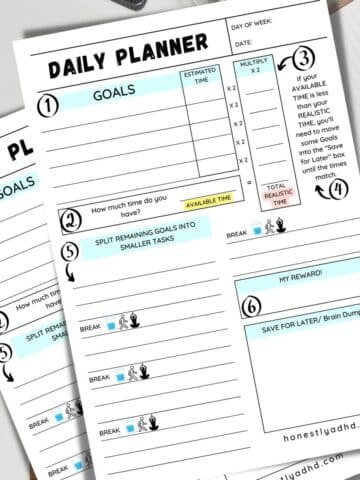The content on this website is for informational purposes only and is not meant to replace professional or medical advice. See our full disclaimer.
In partnership with Coachbit, a personalized study and life skills program for kids and teens backed by scientific research.
School can feel like a never-ending battle for a child with ADHD. What’s worse, the odds are stacked against them. School failure rates of kids with ADHD double to triple those without the disorder.
What’s more, currently about 50% of kids with ADHD repeat a grade by adolescence. So what can you do as a parent if you find yourself on the wrong end of those statistics?
First and foremost - you are not alone. Your child is not abnormal, nor are they being difficult. However, this doesn’t mean that the journey doesn't sometimes feel frustrating and lonely.
More than anything, we recommend this - get all the help you can!
Let’s find out why failure at school is so common for kids with ADHD and what you can do as a parent to get your child back on track.
Jump to:
Why ADHD Makes School Work So Difficult
Many symptoms of ADHD directly affect kids' ability to function at school.
The better-known symptoms, hyperactivity and inattention, are only the tip of the iceberg. ADHD expert Dr. Russell Barkley says ADHD kids' executive age can be up to 30% behind their peers.
Many kids with ADHD also:
- Struggle to complete tasks
- Find it hard to follow instructions
- Misplace important items
- Appear unresponsive when spoken to
- Are disorganized
- Neglect small details and make careless mistakes
When it comes to their school work, this means they hand work in late (or forget to hand it in at all!), make countless small mistakes in tests, lose paperwork and forget books at home, and lose track of time, leading to incomplete work. This leads to poor grades and, in the worst case - failure.
These challenges and constant disappointments tend to decrease motivation and increase frustration in kids. The cycle continues, leading to a lack of engagement in schoolwork and a sense of underachievement.
So what can you do as a parent to help your child get back on their feet?
Here are three ways to embrace the support of those around you to get your child back on track and set them up for success at school.
#1 Implement classroom accommodations
There are many classroom accommodation options available to support your child at school. These can be tailored to address your child’s unique learning needs and create a supportive learning environment.
You’ll need to collaborate closely with your child’s teacher to determine the most effective accommodation for your child.
These can include:
- Flexible/preferential seating: Providing kids with multiple options beyond the traditional desks and chairs. Students usually use bean bags, floor cushions, stability balls, standing desks, and wobble stools. This promotes movement and a more engaging learning environment.
- Modified assignments: Teachers can provide modified assignments that accommodate kids attention spans. Breaking down complex tasks (with our free printable worksheet) into smaller, manageable steps and providing additional time for completion can help students stay organized and engaged.
- Assistive technology: Utilizing assistive technology, such as text-to-speech software or digital organizers, can support students with ADHD in staying organized, managing assignments, and improving their productivity.
Note: Should your child have more significant challenges, work with your teacher to develop an Individualized Education Program (IEP) or 504 Plan. These formal plans outline specific accommodations, modifications, and support services tailored to your child’s needs.
#2 Find an ADHD Coach
An ADHD coach can provide valuable support to both you and your child. An ADHD coach will work closely with you and your child to identify their strengths, weaknesses, and learning style to create a personalized learning plan.
An ADHD coach can assist your child in developing the following:
- Organization skills - This is the most common challenge for kids with ADHD. A coach can help your child use a planner, create effective schedules and to-do lists (like our free ADHD daily planner sheets), and develop easy-to-follow routines.
- Time management skills - This is an area of weakness for kids with ADHD, which leads to late or incomplete assignments. A coach will teach time management techniques such as goal-setting, task prioritization, and timers.
- Study skills - A coach will teach your child effective study strategies tailored to their learning styles, such as visual aids, memory techniques, and note-taking.
Most importantly, a coach provides accountability and emotional support. They will help your child develop resilience, confidence, and the coping mechanisms necessary to tackle the emotional challenges often associated with ADHD.
Many do not even consider an ADHD or life coach for their child due to high costs. Some can charge up to $700 for just an hour session a week, but with Coachbit, an ADHD coach will check in with your child daily for just $6 a day! It’s well worth the investment.
Coachbit is a mobile app made specifically for kids with ADHD, which can help your child keep track of their tasks with the support of a real-life coach that checks in with them daily, teaches them study skills, and keeps them accountable!
#3 Consult with healthcare professionals
Evaluate the severity of your child's ADHD symptoms. If their symptoms affect their academic performance to the point of failure, they are likely significantly impacting their daily life in other ways. If this is the case, we recommend consulting with a healthcare professional.
If your child has not yet been professionally evaluated or diagnosed, seek an evaluation from a qualified healthcare practitioner such as a pediatrician, psychiatrist, or psychologist. They will assess your child’s symptoms, behaviors, and overall functioning to determine an accurate diagnosis.
They will consider your child's unique needs, the potential benefits and risks of medication, and the availability of therapeutic resources.
They can also give you a better understanding as to whether a change in diet or supplements like probiotics or methylated vitamins can help your child's ADHD symptoms.
Therapy can provide valuable support, and many options are available, such as cognitive behavioral therapy (CBT), which can help your child develop practical coping strategies. Occupational therapy is another option, addressing sensory processing difficulties and helping your child with fine mortar skills challenges.
Conclusion
The traditional school system can be highly challenging for kids with ADHD. It does not set them up for success. The truth of the matter is that you, as a parent, will most likely have to push for your child’s needs to be accommodated.
There are, however, resources available to make your job a little easier, and people out there willing and able to carry the load and care for your child with you. All you have to do is ask for help.
Brought to you by Coachbit
Coachbit delivers a personalized study and life skills program for teens and kids backed by scientific research through the Coachbit mobile app (iOS/Android).
Short daily interactive coaching sessions with an expert (and friendly) coach via the Coachbit app keep kids accountable and on track to creating positive habits and core skills that last. We help families prepare their kids for life!






We'd love to hear from you